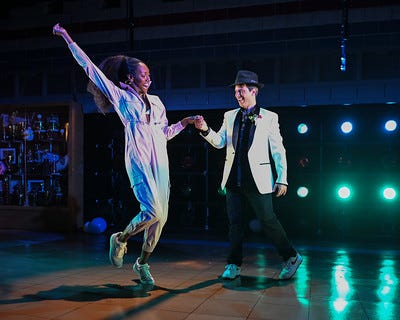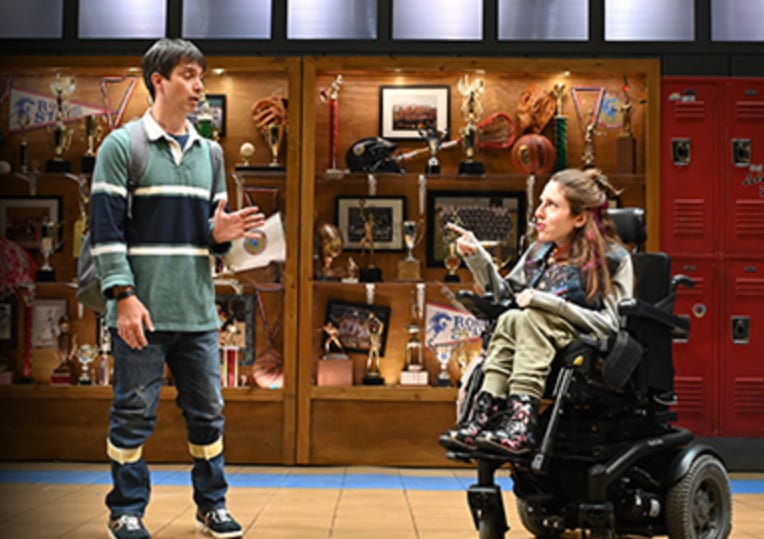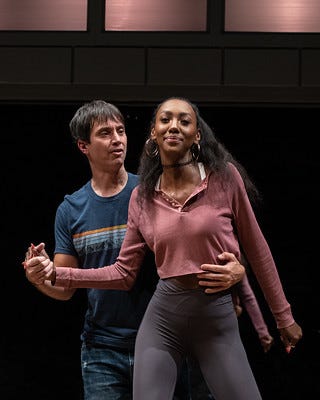The Massachusetts Medievalist on "Teenage Dick" and Winter of our Discontent
CW: description of a suicide scene in a play.
The Massachusetts Medievalist was very pleased to attend an actual live theater performance just before omicron news grew especially dire. Teenage Dick at the Boston Center for the Arts adapts Richard III for the twenty-first century, transferring the play's ambitions and power moves to a contemporary high school, creating a complex, more sympathetic Richard in the process. SPOILER ALERT: remarks that follow reveal plot details of both TD and R3.
Teenage Dick is one in a now-long line of modern adaptations of Shakespeare plays into our teenscape. Think comedies 10 Things I Hate About You (Taming of the Shrew) and She's The Man (Twelfth Night) along with tragedy O (Othello) and the zombie fave Warm Bodies (Romeo and Juliet). Like those films, TD provides a string of insider-references to its source, from the school's name (Roseland High = Wars of the Roses, get it?) to Richard's final speech, offering "my kingdom for some horsepower!"
Much of the media attention on the play has focused appropriately on TD's centering of disability. Shakespeare's hunchbacked Richard refers to himself as "deformed, unfinish'd" (I.i), and most of the R3 characters, including Richard, see his body as a physical manifestation of his "subtle, false, and treacherous" nature. In TD, two of the six characters are disabled (as are the actors who play them): Richard (Gregg Mozgala) has cerebral palsy, while Buck (Shannon DeVido) uses a wheelchair. As disabled teens in the cruel culture of the American high school, they are inherently more sympathetic than Shakespeare's murderous, conniving soldier. That sympathy also complicates the narrative in interesting ways, as Buck is less complicit than R3's sycophantic Buckingham and Richard is more justified in his anger towards Eddie and the rest of the high school "royalty."
But I was most taken by Richard's love interest, Ann Margaret, stupendously played by Zurin Villanueva. Like R3's Lady Anne, this Ann is initially seduced by the ways an alliance with Richard can promote her own interests; unlike Lady Anne, Ann has a developed back story and character arc. Ann and Richard's performance at the Sadie Hawkins dance (top) - for which they have practiced in a studio as they begin to know and understand each other (below) -- is glorious. And it makes his later betrayal of her that much more devastating. We don't really care when Lady Anne dies in R3 -- we don't know her very well, and she functions as merely another indicator of Richard's duplicity and violence. Playwright Mike Lew and Villanueva center TD's Ann to make a compelling and damaging statement about women in Shakespeare's plays and in culture at large, then and now.
Ann's suicide is horribly timely and timeless. In the spare scene of the small play, she stands over a tin bucket and her speech lets us know she's in her bathroom, unable to face her life in this ruinous community exploiting her anguish for gains in social status, both real and virtual.
She indicts Shakespeare specifically and patriarchy in general for seeing women merely as appendages to male-centered narratives. She bitterly apologizes for taking up space and promises she'll get out of the way soon so we can re-focus our attention on the man who is the main character both in the play and in the world at large. She makes us watch as petty cruelty smothers her creativity and kindness and brilliance. And then, blood on her arms and her neck, she walks off stage to become the ghost that will haunt Richard as he faces his own death.
Omicron is in Boston. The play is theoretically running till 2 January at the Boston Center for the Arts, but I suspect it will shutter early. The good news is that there's also a way to purchase digital tickets. Be forewarned that this is not holiday entertainment - it's the winter of our discontent.




